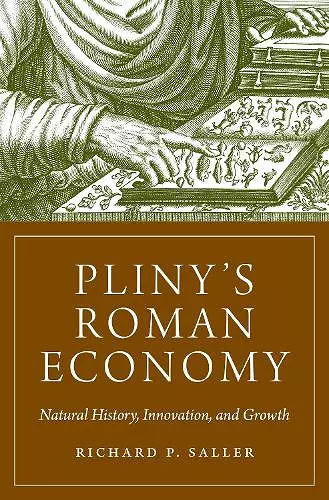Pliny's Roman Economy
Natural History, Innovation, and Growth
Format:Paperback
Publisher:Princeton University Press
Published:5th Dec '23
Should be back in stock very soon
This paperback is available in another edition too:
- Hardback£32.00(9780691229546)

The first comprehensive study of Pliny the Elder’s economic thought—and its implications for understanding the Roman Empire’s constrained innovation and economic growth
The elder Pliny’s Natural History (77 CE), an astonishing compilation of 20,000 “things worth knowing,” was avowedly intended to be a repository of ancient Mediterranean knowledge for the use of craftsmen and farmers, but this 37-book, 400,000-word work was too expensive, unwieldy, and impractically organized to be of utilitarian value. Yet, as Richard Saller shows, the Natural History offers more insights into Roman ideas about economic growth than any other ancient source. Pliny’s Roman Economy is the first comprehensive study of Pliny’s economic thought and its implications for understanding the economy of the Roman Empire.
As Saller reveals, Pliny sometimes anticipates modern economic theory, while at other times his ideas suggest why Rome produced very few major inventions that resulted in sustained economic growth. On one hand, Pliny believed that new knowledge came by accident or divine intervention, not by human initiative; research and development was a foreign concept. When he lists 136 great inventions, they are mostly prehistoric and don’t include a single one from Rome—offering a commentary on Roman innovation and displaying a reverence for the past that contrasts with the attitudes of the eighteenth-century encyclopedists credited with contributing to the Industrial Revolution. On the other hand, Pliny shrewdly recognized that Rome’s lack of competition from other states suppressed incentives for innovation. Pliny’s understanding should be noted because, as Saller shows, recent efforts to use scientific evidence about the ancient climate to measure the Roman economy are flawed.
By exploring Pliny’s ideas about discovery, innovation, and growth, Pliny’s Roman Economy makes an important new contribution to the ongoing debate about economic growth in ancient Rome.
"Saller’s book is truly interesting in many ways. Not only does it do justice to the existence of a reflection on economy in Western antiquity and to its few points of convergence with modern economic thought, but [it] also . . . raises a question that goes beyond antiquity: that of the conditions that make long-term economic growth and development possible, with a particular interest in cultural causes."---Etienne Helmer, Bryn Mawr Classical Review
ISBN: 9780691229560
Dimensions: unknown
Weight: unknown
216 pages